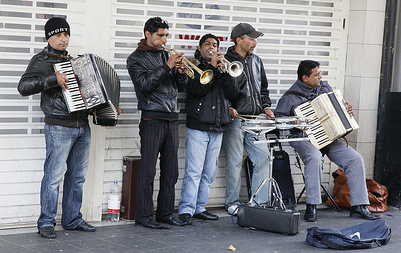Anderson & Munby’s Hard Council

Photo: sixeightthree.
The summer of 2012 will be remembered for many things, the Queen’s Jubilee celebrations, the Olympics and the continued stagnation of the UK economy, amongst other events. The street artists and performers of Liverpool will remember it for another reason, however: it was a time when a ragtag collection of artists, misfits, buskers and other concerned citizens stood up to Liverpool City Council and said a resounding ‘No!’ to their restrictive and coercive license scheme. Liverpool Council’s ‘Street Activity Management Plan‘ covered street preachers, skateboarders, political activists as well as buskers. The policy had sought to strangle the freedom of all those whose use of public space in Liverpool City Centre did not meet the council’s limited criteria of approval. Well-trodden streets were, at the stroke of a bureaucratic pen, turned into ‘regulated entertainment zones’ where impromptu performers faced the threat of trespass prosecutions if they dared to play without a council permit. The policy had been lobbied for by the City Central Business Improvement District (BID), an unelected, democratically-unaccountable, quasi-governmental body that represents the interests of major retailers in exchange for an additional layer of rates. For them, the urban environment is a space that needs to be tightly controlled and managed. In Councillor Stephen Munby, they found a local politician prepared to endorse their vision of a city centre that kept all ‘un-authorised’ street activity at bay and enabled the veneer of democratic approval to be placed upon a policy that was coercive, anti-democratic – not mention unlawful – to it’s very core.
Whatever it was that drew Stephen Munby into politics, and, by all accounts he was something of a marxist firebrand in his youth (he wrote for Marxism Today and Challenge, The Young Communist League’s Magazine amongst others), I doubt it was the desire to oversee and legitimise a heavy-handed clamp down upon street culture. When Joe Anderson joined the Labour party I’m sure that siding with the perceived interests of the rich and powerful against the marginalised and the vulnerable was not his primary motivation. In fact, I have no doubt that both men have, at times, been motivated by the genuine desire to serve the public and to make the world a better place. But when these elected politicians, however unwittingly, give legitimacy to policies that are coercive and soul-sapping in their assault upon freedom and creativity, they must be held to account. This is why the Keep Streets Live! campaign launched a legal challenge with the support of Kirwans Solicitors which saw the council withdraw their contentious legislation in September this year. That is why we were hoping that the council would take the opportunity presented by the abandonment of their scheme to work with the city’s street artists and performers, with the input of the Musician’s Union, to come up with a best practise guide that enhances the vibrancy of the city centre. We were still waiting for the council’s invitation to such a meeting when the next phase of their busker clampdown began.
Over the past three weeks Liverpool Council have conducted an operation that involved council officials, accompanied by police officers, approaching every street performer in the city and asking them for their names and addresses. We at ASAP! believe that in a free society it is an act of intimidation to approach a person who is behaving lawfully with uniformed officials and to ask for names and addresses, so we advised street performers to politely decline such requests. When performers did decline they were told to move on, that they were causing an obstruction and, in some cases, vague threats of arrest were made. When our solicitor David Kirwan wrote to the Council’s solicitor to ask for an explanation of their behaviour he received an evasive and dissembling reply:
The City Centre Management Team conducted a joint exercise with Merseyside Police and Environmental Health over two weekends to ensure that all busking activity in the City Centre was being conducted without causing any issues in relation to noise nuisance or obstruction and also to ensure that all buskers were aware of what is required of them to ensure vibrant city centre entertainment which works for all stakeholders.
To people on the ground it was experienced more as a coordinated campaign of harassment and intimidation, especially as no-one who was approached was doing anything unlawful or disruptive. The reply continued:
As part of the activity, buskers were approached and were given advice and guidance in relation to issues such as noise nuisance and obstruction. As a local authority, we have a statutory duty as regulators to ensure that we evidence any advice and guidance that we distribute prior to implementing any enforcement which may prove necessary. It was pursuant to this requirement for evidence that names and addresses were sought so that the Council would have to hand details of those to whom we had spoken and the information with which they had been provided.
When you cut through the thick layer of jargon and bureaucratic language, this makes it sound like it was no more than a council outreach program on behalf of buskers. It was no such thing. It was a coordinated attempt to intimidate street artists, and to show them who was in charge following the council climbdown over the summer. We received many reports of buskers being threatened with arrest, moved on by the police, and even being told by council officials that details of who was performing on ‘Liverpool Council’s property’ would be passed on to the Inland Revenue and Benefits Office to ensure that no benefits claims were being made. This is unnacceptable behaviour designed merely to cause fear and uncertainty.
These are hard times. We have a national government who are cutting the benefits of the poorest and most vulnerable members of our society and starving local authorities of the money they need to carry out their statutory duties. Jobs and money are scarce, people are suffering. In this light, is it acceptable for the local authority to be diverting the scarce time and resources of the police and other bodies for a Christmas clamp down on buskers, when budgets are already stretched to the limit? There are deep social problems in Liverpool, harsh budget cut-backs, a housing crisis, high unemployment, homelessness and widespread drug and alcohol dependency. With this in mind, it seems obvious that such issues that are genuinely caused by buskers are easy to deal with, without the need for heavy handed action against performers or spending scarce council time and money passing legislation that restricts street culture in a city whose very lifeblood is music. The Council observe that there are more buskers then ever before, but why this should surprise them at a time of high unemployment is beyond us. Why do they feel the need to make life more difficult for performers then it already is? The local authority are best understood as stewards and guardians of our public spaces. They should be celebrating the diverse talent that take to the streets to entertain the public, they should support those individuals who brave the elements with no guarantee of reward and animate the urban environment, and they should stand alongside all users of the shared public spaces of the city centre and work with us all to build community and resolve such issues as do arise amicably.
So Councillor Stephen Munby and Mayor Joe Anderson, let’s put a stop to this silliness. You both have better things to be spending your time on then worrying about buskers on the streets of Liverpool. There are a lot of people suffering right now. There is poverty all around us. The shiny new Waterfront developments and LiverpoolONE do not hide the fact that deeper problems face the Liverpool community then a few ‘pesky’ buskers. ASAP! wants to work with you, with the help of the Musician’s Union, to find creative ways of dealing with busking issues without resorting to coercive legislation or heavy handed council action. Liverpool is known worldwide for its culture and music, but also for its friendliness and openness of spirit. By working together, we can build on Liverpool’s growing reputation and enhance the life of the city. We are waiting for your call Liverpool City Council.





